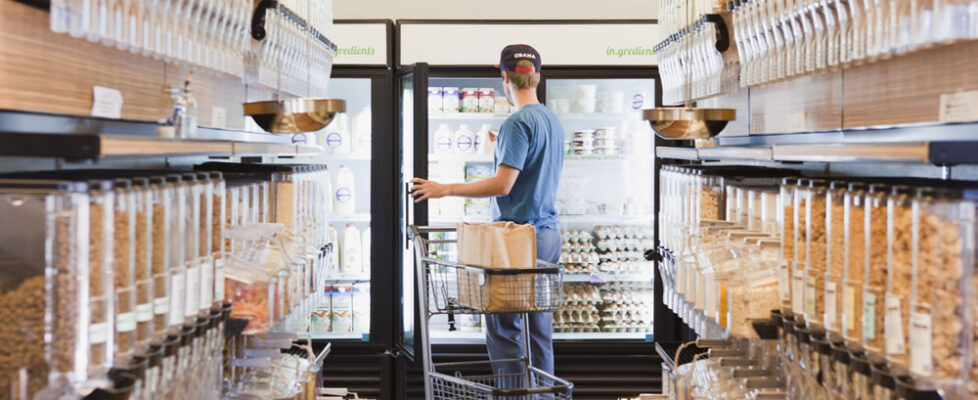Shop Outside the Box
Over the last decade, shoppers have laid to rest the paper-or-plastic question once and for all by using a set of reusable shopping bags. It’s a simple way to use less. Just like giving up plastic bags, eco-conscious stores and shoppers are going beyond the bag to eliminate unnecessary packaging altogether. Just imagine a shopping cart filled with food and not a single box, can or plastic wrapper in sight. OK, so that might be a stretch for the average person, but eco-grocery shopping involves more than remembering your reusable bags. Here’s how to reduce your food and packaging waste (and eat healthier, too!).
Reducing waste requires more than avoiding paper and plastic. Forget the bag completely and bring your own container.
REUSABLE PRODUCE BAGS
Avoid these little bags altogether to keep them out of the landfill or from the energy-intensive process of recycling. Mesh bags are light, the cashier can see through them to ring your order and you can wash and store the produce in the bag. After committing yourself to reusable grocery bags, using reusable produce bags is a cinch.
BUY BULK
According to the Environmental Protection Agency, in the U.S., packaging and containers accounted for the largest portion of municipal waste generated in 2010. Lose the food packaging and not only is there nothing to toss, but there was no energy used to produce the packaging in the first place. “There is a lot of unnecessary waste in conventional shopping,” says Chelsea Davis, marketing representative and events planner for in.gredients, a package-free grocer in Austin, Texas. Because most of the food in the store is available without packaging, with the exception of dairy and meats, which must be packaged to code, a large amount of food can be accommodated in a smaller, more efficient space. The store features bulk shopping for grains, pastas, beans, cereals, cooking oils, nuts and spices. Customers bring their own clean, reusable containers, or they can purchase reusable or compostable containers from the store) and buy only what they need. Local produce, baked goods, dairy and meat are also available. You can even bring your own jug to fill with craft beer. Check out your local grocery: Many conventional stores have surprisingly large bulk selections. If not, check out health food, organic and ethnic stores, as well as farmer’s markets.
CHECK THE CODES
Before you head to the store with canvas bags and containers, do your homework. Health codes regarding how food can be packaged, by whom and in what kind of container vary on state and local levels. Stores may have their own policies. Bea Johnson, author of the blog and book “Zero Waste Home” (Scribner, 2013), has bulk shopping down to a science. Like most people, the Mill Valley, Calif., mom of two likes one-stop shopping. She shops at Whole Foods, where the bulk food selection is good. She brings her own fabric bags and containers and fills them with exactly what she needs. She even carries a washable crayon to write the item number on bags and containers so she doesn’t have to print a sticker.
SHOP THE COUNTERS
The perimeters of grocery stores offer the healthiest foods, but shopping the counters has an overlooked benefit: It makes you feel like part of a community. “The way I used to shop was basically incognito,” Johnson says. “I could go into the grocery store and I didn’t have to look at anyone, I didn’t have to talk to anyone, and I would not have any human contact whatsoever. “Now it’s totally different. I actually look forward to talking to the staff that I meet every week, “she says. Johnson’s shopping trips start at the bakery counter where she orders 10 fresh baguettes with no plastic sleeve. Before checking out, she picks them up and puts them in a pillowcase. Since she always has the same order, she reuses a copy of the barcode to pay so a new sticker isn’t necessary. Johnson has a variety of large glass jars for storing, freezing and transporting meat. When she purchases meat, fish and cheese she asks that they be packaged in large glass jars. Yes, you will get weird looks – even at seemingly progressive stores. Again, check the health codes and company policy before you shop, but don’t be afraid to question policies when health codes wouldn’t be violated, Johnson says. Once managers and staff understand what you are doing, she says, they are usually willing to accommodate you.
PACE YOURSELF
Buying only the food she needs from bulk bins, the produce section and meat and deli counters saves money, prevents food waste and produces no packaging waste, Johnson says. This shopping style may seem extreme or out of reach, but keep in mind her family didn’t go from producing a large container of trash every week, to less than a liter in an entire year, overnight. “This was a gradual process,” emphasizes Johnson. “Organize yourself, and while it will take some time to figure out a system, once that system is in place it’s a piece of cake – you don’t have to think about it.”


